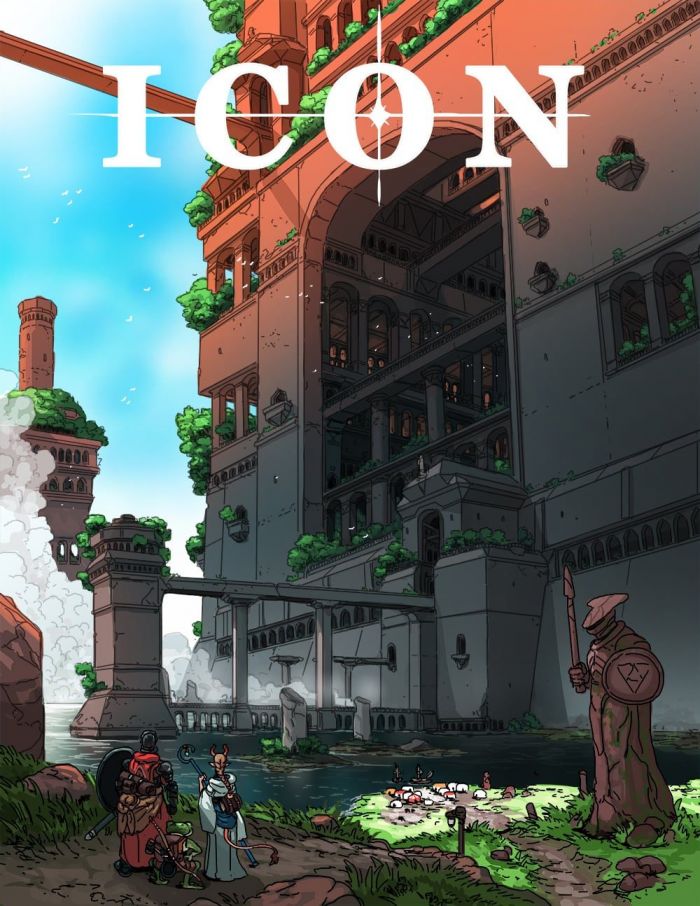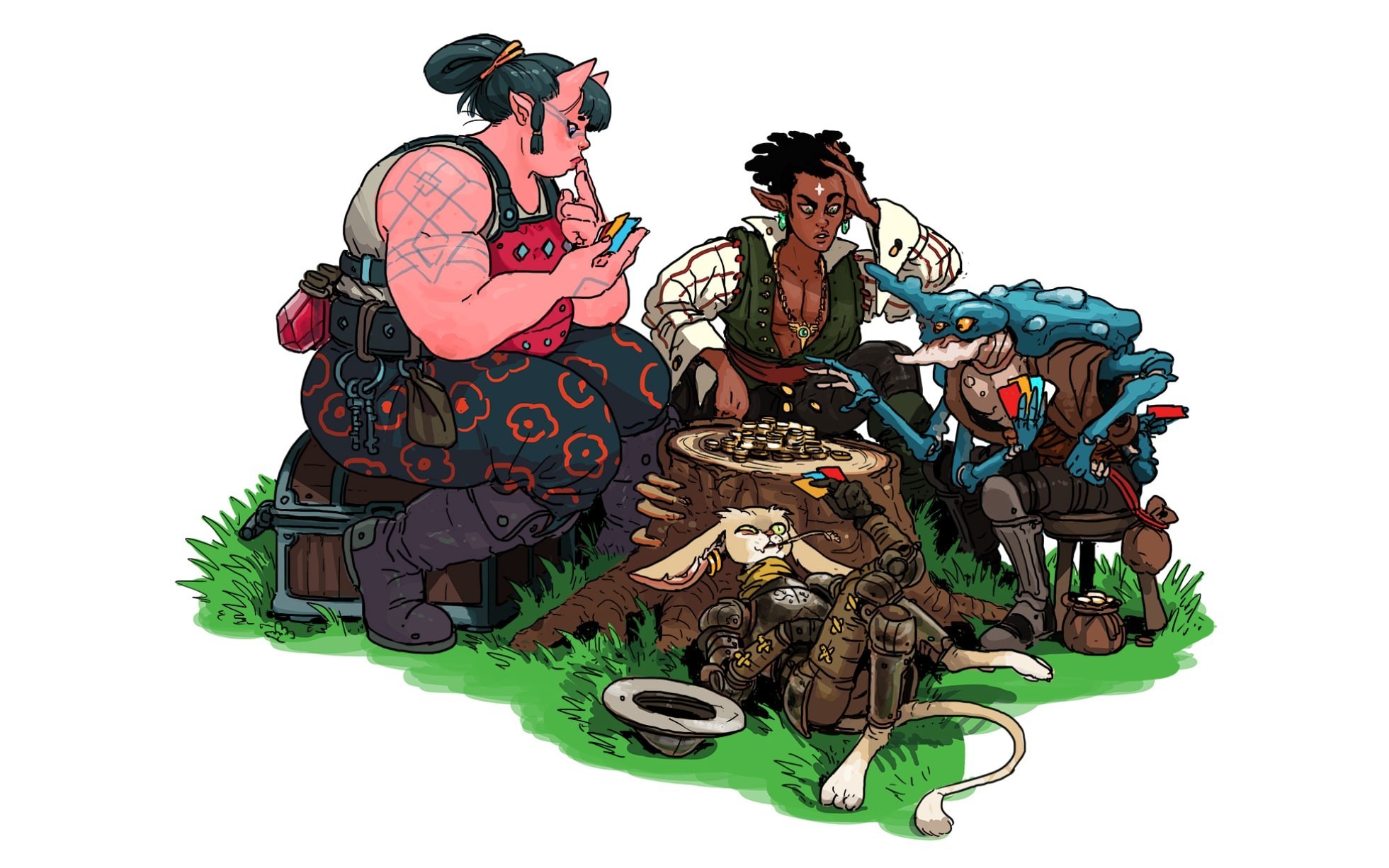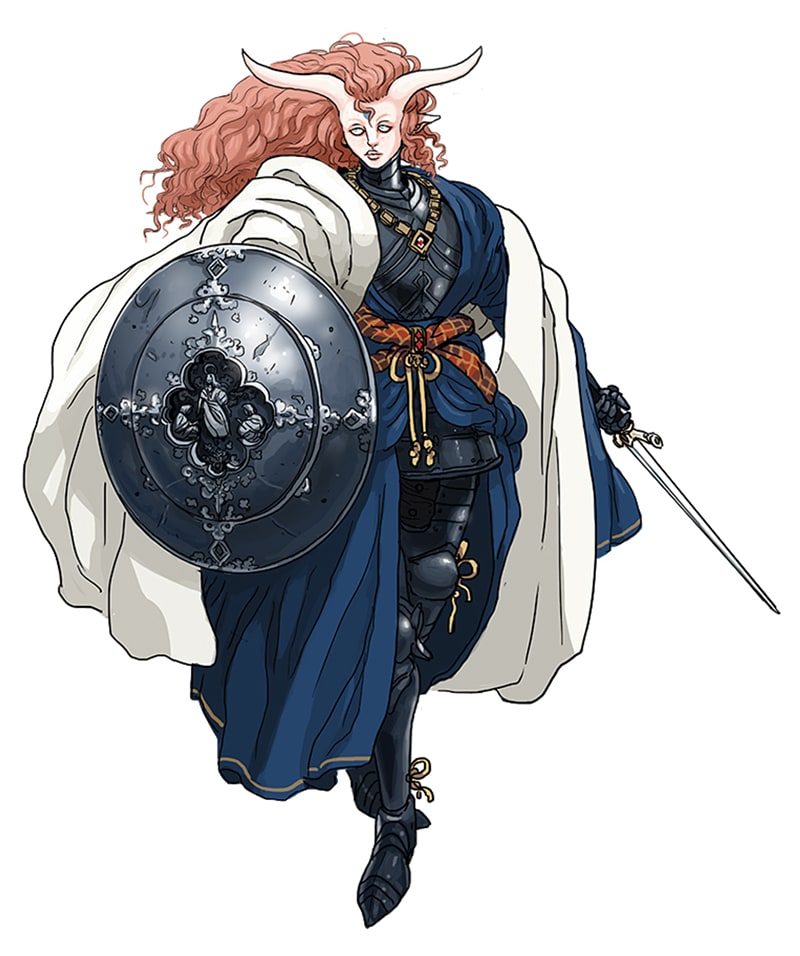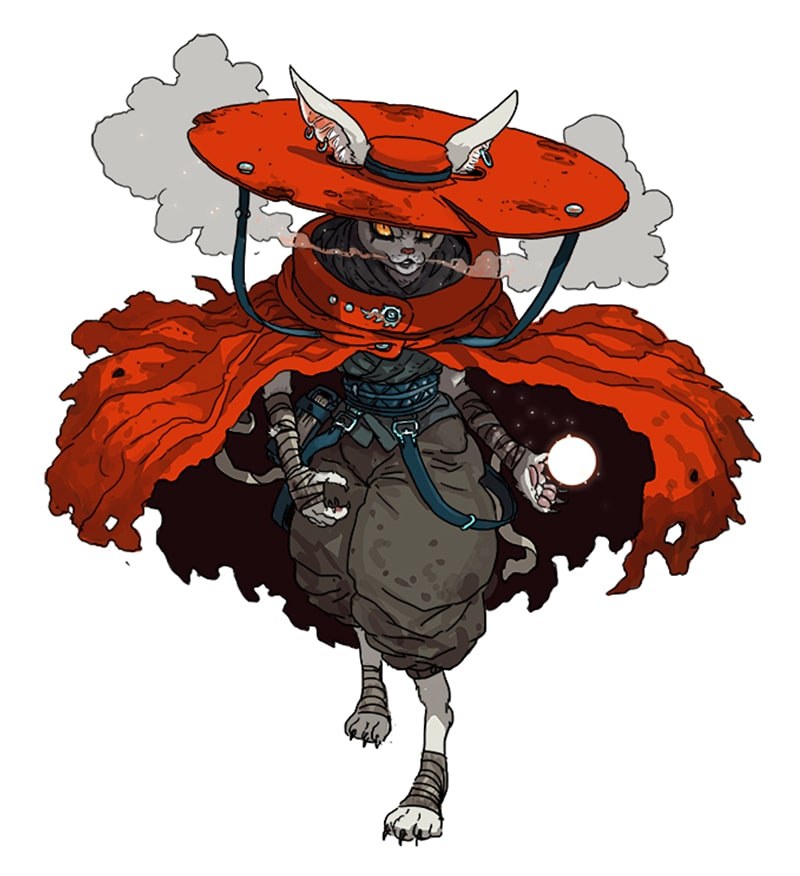Massif Press’ Icon Is a “Mythic Fantasy” RPG Inspired by Anime and Video Games

Sigh… so many games, so little time… Massif Press’ Tom Parkinson-Morgan — co-creator of the Lancer RPG and creator of the acclaimed Kill Six Billion Demons comic — is currently developing a new “mythic fantasy role playing game” called ICON.
Compared to Lancer, which is set thousands of years in the future and is centered around fantastical mech combat, transhumanism, and post-scarcity economics, ICON looks much more like a straightforward “high fantasy” RPG — albeit a “high fantasy” RPG inspired by anime and video games more so than, say, J. R. R. Tolkien’s Lord of the Rings, Jack Vance’s Dying Earth, and Robert E. Howard’s Conan the Barbarian.
Here’s how Parkinson-Morgan describes ICON’s aesthetic and inspiration in the game’s foreward:
This game was born from my love of fantasy. I love that old-school mysterious, enormous-world fantasy vibe that is reproduced so well in animation, comics, and games. This game is inspired by the feeling I think you might get when you look at the main cover. I took inspiration from anime, the works of French comic artist Möebius, Studio Ghibli, and video games like Shadow of the Colossus, Dragon’s Dogma, and The Legend of Zelda.
Later in the game book, he writes (emphasis his):
ICON is a game about playing heroic characters that fight for their ideals. They go on expeditions to fight monsters, explore ruins, and gather power. During interludes, they build, heal, and learn. Eventually they may end up changing or saving the world. Heroic in this context doesn’t necessarily mean “altruistically motivated” but “fated,” or “larger than life.”
ICON, however, is far from finished. Instead, Parkinson-Morgan has released the game’s core rulebook as a free download for play testing, noting that most of his time is still occupied by completing materials for Lancer’s Kickstarter campaign. But even a cursory look at this “rough” version of ICON’s rules is pretty tantalizing. (Note: I’m not going to focus too much on ICON’s game mechanics, which are inspired by Blades in the Dark, but rather, its lore, setting, and mythos. Dicebreaker has also posted an overview of the game.)

One of the things that first drew me to Lancer was its elaborate mythology and world building. ICON is cut from similar cloth. It’s set in a world called Arden Eld that was once conquered by the Arken Imperium, a cruel and powerful empire that dominated the world with a blend of magic and technology — until it suddenly fell to ruin. In the millennium that followed, Arden Eld began to heal from the cataclysm and entered a “Green Age” of peace and prosperity.
But the Imperium’s legacy lingers on in the form of ancient ruins, strange magic, and bizarre creatures that occasionally scour the countryside. As a result, Arden Eld now stands on the verge of a new age, the “Churning Age,” as its peoples develop a growing desire for the Arken Imperium’s secrets and technology. The world’s idyllic existence is increasingly threatened by the specter of war, and greed and strife have begun to plague the land.
Your character is an “icon,” someone who stands between these two ages. You can choose to be an adventurer or treasure hunter seeking out the Imperium’s ancient secrets. You can use your power to defend the peoples of Arden Eld from the many creatures emerging from the Imperium’s ruins. You can choose to protect the “Green Age” or bring about the “Churning Age.”

Much like other fantasy RPGs, creating an ICON character involves picking a Kintype (the game’s analog for race) and culture. There are several Kintype options, including the elvish-looking Thrynn and the insect-like Xixo. Unlike Dungeons & Dragons’ races, however, different Kintypes don’t have their own “racial” bonuses. Rather, bonuses come from a character’s culture, which reflects where they live and work. Arden Eld being a diverse world, a culture can encompass members of multiple Kintype. Cultures include the rural Yeokin, the seafaring Islander, and the monastic Chronicler.
As for classes, there are two types in ICON: a general class called a “Bond” that determines the character’s abilities in narrative play, and a specialized class called a “Job” that determines their abilities in combat. There are nine Bonds in ICON, including the “Pathfinder” (a skilled wanderer and adventure not unlike a ranger), the inquisitive “Seeker” (who is obsessed with seeking new and forbidden knowledge), and the rarefied “Highborn” (whose wealth and privilege affords them special advantages).

Jobs are more complicated. There are 16 jobs in all, and each Job belongs to one of four Classes. For example, the “Bastion” (an honor-bound knight who smashes enemies with their shield) and “Colossus” (a crazed berserker) Jobs belong to the martial “Stalwart” class. Meanwhile, the “Enochian” (a chaotic magician who can launch devastating fiery attacks) and “Spellblade” (who attacks with the speed and fury of lightning) belong to the “Wright” class, which uses Aether (think the Force) to achieve various effects.
Individual Jobs have specific skills and abilities, and all of the Jobs that belong to a specific Class get that Class’ skills and abilities.
All told, ICON’s approach to character building seems primarily focused on the diverse and fantastical, especially as the rules make it easy to add additional Jobs and swap between them as you see fit. (Or you can keep the same Job to master it.) In keeping with the anime influence, a lot of the Job and Class-related powers are over-powered in a way that’s very anime-esque, and definitely in keeping with the game’s “mythic fantasy” vibe.
Of course, what good is having awesome powers if you don’t have anything worth fighting? As expected, Parkinson-Morgan has a specific vision here, too. Again, from the rule book:
The ruins that litter Arden Eld and churn beneath its surface are sometimes peaceful, hollow affairs — full of dust and destroyed monuments to a dead empire. More often than not, however, they are host to innumerable monsters that slither, crawl, and stalk through their hallways, born of the Doom that befell the Arken Empire and the grand technomagical projects they undertook. These ruins can be deadly places despite the riches they offer, and occasionally when a ruin surfaces, it disgorges hordes of monsters that eventually boil over into the surface world, called a Blight.
There are a variety of foes to be encountered during your travels through Arden Eld and your exploration of the Arken Imperium’s ruins. Some of these might be fellow Kin who’ve grown ambitious or desperate with the Churning Age’s arrival, resorting to violence to survive and get what they want. Others might be foul beasts who have been warped and corrupted by Imperium’s legacy.
Even worse are Relicts, mindless husks animated by the remaining vestiges of the Imperium’s magic. Worst of all are Demons, infernal creatures who are linked to the doom that destroyed the Arken Imperium so long ago. And then there are the immortal Jotunn, giants who descended from the ancient Titans that once held up the world before being cast down by the Arken Imperium, and who are destined to melancholy or madness.
I’m a sucker for stories involving the remains of lost and ancient civilizations that are filled with unimaginable discoveries and unthinkable horrors. (Which explains, in part, why I like Halo so much.) So all of this stuff is right up my alley.
Although ICON is clearly a work-in-progress that’s missing some important elements (like official character sheets), it does contain the most important aspect for a fantasy RPG: a unique and imaginative world that people can’t wait to explore with their friends.
If any of this appeals to you, then consider following ICON’s progress. It’s already off to a solid start, and suffice to say, if there’s ever a Kickstarter for it, I’m all in.